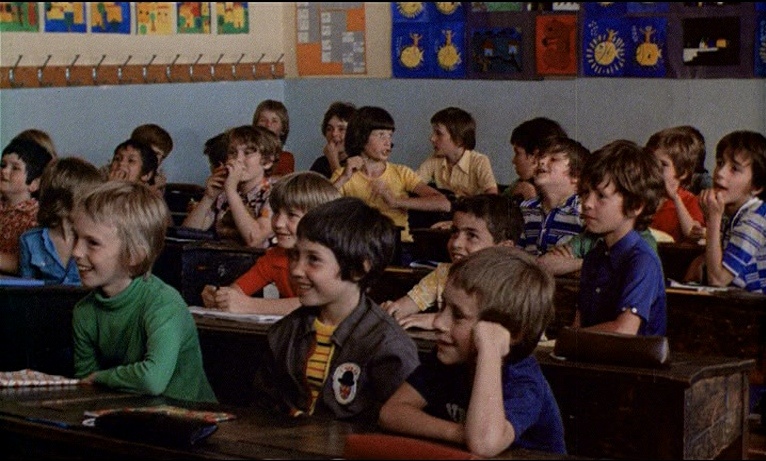France, 1976
Directed by François Truffaut
With Georges Desmouceaux (Patrick Desmouceaux), Philippe Goldman (Julien Leclou), Claudio De Luca (Mathieu Deluca), Franck De Luca (Franck Deluca), Sylvie Grezel (Sylvie), Jean-François Stévenin (Jean-François Richet), Chantal Mercier (Chantal Petit)

A crowd of kids spreads through the streets, invading the town and crisscrossing it endlessly. The film’s story is not focused on a single fate, like “Les quatre cents coups – The 400 Blows” in 1959 or “L’enfant sauvage” in 1970, but tracks many characters at once. The relations with the adult world are more flushed out and less awkward than before; actually, the narrative grants time to some of these grown-up people so as to depict, or at least suggest, what their lives and feelings are when the children are not watching; that include their schoolteachers, Chantal Petit and even more Jean-François Richet, whose wife is with child.
The camera tours the streets and key places, the school, the cinema, the hairdresser’s shop, capturing the routines and the flavor of the time and the town where the film takes place, a quiet small town in Auvergne, a rural region at the center of France, in the mid-1970s, as new notions on mores, social issues, and lifestyle percolate through the social fabric in the wake of the 1960s protests. Yet the style is less inventive, more traditional than in Truffaut’s first films; but at the same time, his vision gets a strikingly wider scope while keeping a benevolent and sympathizing take on the characters, starting with the film’s heroes, the children.
He enjoys depicting how these kids can be naughty, mischievous, disingenuous, and also spontaneous and straightforward. His camera lovingly catches on the fly whatever they are up to to get satisfaction but also the small talks between them revealing what intrigues them or makes them laugh. The clever way a little girl, Sylvie, gets food and sympathy from the neighbors after being banned from coming to the restaurant with her parents is just as unbelievable as it is unforgettable while the antics of two brothers from the South, Mathieu and Franck De Luca, are a regular and truly hilarious feature.
Two characters stand out. Julien Leclou is first shot as an awkward presence that does not fit in the school; the fact is, he has been enrolled by the authorities in the course of the academic year; he would rather stay alone most of the time, with his mischievous tricks being increasingly real misdemeanors. He is an epitome of the neglected, abused, ill-fated kid while Patrick Desmouceaux is a more congenial and endearing child, whose life has driven him to fend for himself and to take care of others (he has no mother and lives with a wheelchair-bound, middle-aged father). But if he is well-loved he is increasingly stirred by the kind of love women can elicit and his adventures illustrate the awakening of a very young teenager to romance.
These two kids encapsulate much of the ideas and feelings of the director about children as expressed by his films, each representing specific aspects of Antoine Doinel’s life (the boy rejected by the adults and then the young man loving women). Their respective narrative arcs lead “L’argent de poche” to a double ending that are awkwardly put one after the other, as if Truffaut wanted to show hope and to tack a happy ending to his chronicle even as he was keen on lecturing the audience in the wake of a tragic development.
This tragedy is that the authorities eventually found out how Julien Leclou was beaten and hated by his relatives, who are arrested while he is sent to a foster home (that comes as a shock to Chantal Petit, who guessed nothing; the film, by the way, has always refrained from studying the case, opting rather to suggest the drama). The scandal causes Jean-François Richet to give explanations to the school’s pupils, which soon becomes a rambling discourse about his life and the responsibilities of adults and the rights of children. He stands as the spokesman of Truffaut who clearly feels the urge to make a statement, emphasizing the import of getting the right attitudes and behaviors with children, laboring the point he made with “L’enfant sauvage”, a film that held the same message but just conveyed it through an intelligent and graceful narrative. Then Patrick finds love in a summer camp, bringing his own quest for love to an end. This is a charming coda but also a realistic reminder that childhood, after all, always gives way to adolescence.

